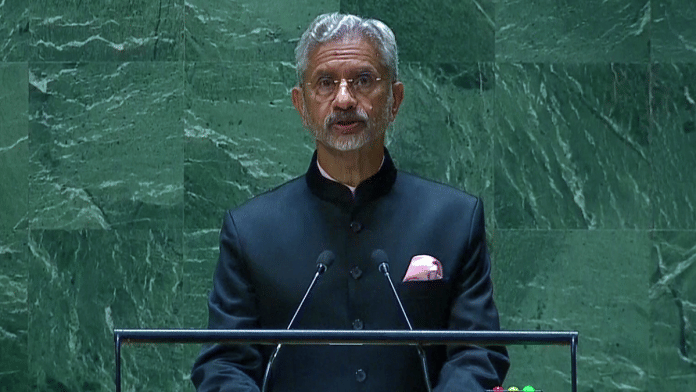New Delhi: Amid the ongoing row with Canada, Foreign Minister S. Jaishankar asserted that “political convenience” cannot determine response to terrorism and added there cannot be “exercises in cherry picking” when it comes to respecting each other’s internal affairs.
“Mr. President, we must never again allow an injustice like vaccine apartheid to recur. Climate action too cannot continue to witness an evasion of historical responsibilities. The power of markets should not be utilized to steer food and energy from the needy to the wealthy,” he said Tuesday at the 78th session of the United Nations General Assembly.
“Nor must we countenance that political convenience determines responses to terrorism, extremism and violence. Similarly, respect for territorial integrity and non-interference in internal affairs cannot be exercises in cherry picking.
“When reality departs from rhetoric, we must have the courage to call it out,” he said, hinting at the recent diplomatic row with Canada.
Bilateral ties are strained since Canadian PM Justin Trudeau’s allegations last week against India on the killing of Sikh extremist Hardeep Singh Nijjar in June. On Thursday, India had dismissed these allegations as “absurd and motivated”, and called Canada ‘a safe haven’ for extremists.
The ensuing diplomatic row has resulted in tit-for-tat expulsions of diplomats, visa bans, reduction of staff at high commissions and more.
Many have indicated that Trudeau’s allegations are a method of using diaspora politics as a votebank to gain influence.
Also Read: 5 Eyes hold the secrets behind Trudeau’s charges. India must worry about its vulnerabilities
‘Few cannot longer dominate rest’
One of the overarching themes of Jaishankar’s speech was that the West can no longer ‘subjugate’ the developing countries.
“The international order is diverse and we must cater for divergences, if not differences. The days when a few nations set the agenda and expected others to fall in line are over,” he said, noting that such dominance “cannot go on indefinitely or “unchallenged”.
“A fair, equitable and democratic order will surely emerge, once we all put our minds to it. And for a start, that means ensuring that rule makers do not subjugate rule takers. After all, rules will work only when they apply equally to all,” he added.
The foreign minister called for the inclusion of India among other emerging countries, into a reformed United Nations Security Council. Citing India’s push for the inclusion of the African Union in the G20, Jaishankar stated: “This significant step in reform should inspire the United Nations, a much older organisation, to also make the Security Council contemporary.”
“Broad representation is a prerequisite for both effectiveness and credibility,” he added.
Jaishankar cited numerous instances where India has pushed to provide ‘vulnerable countries’ access to resources as well as voice out their concerns in the international sphere.
He cited the examples of the Vaccine Maitri initiative during the Covid pandemic and the ‘Voice of the Global South’ Summit in January, where concerns of 125 nations were heard.
“Even as we encourage collective endeavours, India also seeks to promote cooperation with diverse partners. From the era of non-alignment, we have now evolved to that of Vishwa Mitra (a friend to the world),” Jaishankar said. “This is reflected in our ability and willingness to engage with a broad range of nations. And, where necessary, harmonise interests.”
Interestingly, Jaishankar began his speech wishing the UNGA, “Namaste from Bharat” and ended his speech using both of India’s formal names, “India, that is Bharat.”
(Edited by Tony Rai)
Also Read: Canada updates advisory for citizens travelling to India, cites ‘calls for protests’






